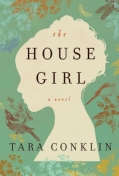BKMT READING GUIDES
The House Girl
by Tara Conklin
Kindle Edition : 0 pages
5 clubs reading this now
1 member has read this book
The House Girl, the historical fiction debut by Tara Conklin, is an unforgettable story of love, history, and a search for justice, set in modern-day New York and 1852 Virginia.
Weaving together the story of an escaped slave in the pre–Civil War South and a determined junior lawyer, The ...
Introduction
The House Girl, the historical fiction debut by Tara Conklin, is an unforgettable story of love, history, and a search for justice, set in modern-day New York and 1852 Virginia.
Weaving together the story of an escaped slave in the pre–Civil War South and a determined junior lawyer, The House Girl follows Lina Sparrow as she looks for an appropriate lead plaintiff in a lawsuit seeking compensation for families of slaves. In her research, she learns about Lu Anne Bell, a renowned prewar artist whose famous works might have actually been painted by her slave, Josephine.
Featuring two remarkable, unforgettable heroines, Tara Conklin's The House Girl is riveting and powerful, literary fiction at its very best.
Editorial Review
Author One-on-One: Maria Semple and Tara Conklin


Maria Semple is the bestselling author of Where'd You Go, Bernadette.
Maria Semple: Tara, huge congratulations on The House Girl. How did this novel come into being?
Tara Conklin: Thanks, Maria. The novel began as a short story that I wrote about six years ago. I came across the term â??slave doctorâ?? in a book I was reading and the words made me stop. I became curious as to why a person dedicated to healing would take on such a role. From that initial spark of curiosity, I wrote a short story about a slave doctor, Caleb Harper, and two women appeared in his story. I say â??appearedâ?? because thatâ??s really how it seemed to happen â?? Josephine and Dorothea just showed up and demanded my attention. I couldnâ??t stop wondering about these two characters and so I started writing separate stories about them, and I just kept writing.
MS: Josephine, a house slave in 1852 Virginia, became one of your narrators. The other, Lina, is a lawyer in present day New York. You practiced law before you became a novelist. Did Linaâ??s voice come easily by comparison?
TC: No, I actually found Linaâ??s sections tougher to get right. I think because Linaâ??s external world is more similar to mine, it was more difficult to imagine her â?? I kept bumping up against my own experience.
MS: Thatâ??s so surprising, that Josephine was the easier voice to get right.
TC: Josephine came to me very organically â?? I felt that I knew who she was and what she wanted early on in the writing. Her character was inspired by two people: one was an African-American artist named Mary Bell and the other was a former slave, Elizabeth Mumbet Freeman, who lived in my hometown during the 18th century. Mumbet said that if she could have one minute of freedom, only to die afterwards, she would make the trade. That strength of purpose helped me understand Josephine.
MS: While she's not a narrator, the character of Lu Anne Bell looms large over the story. She's quite mysterious and wonderful. I'm curious if she, too, is partly based on a real person.
TC: No, she is entirely fictional, but Iâ??m glad that you thought otherwise! I wrote quite a bit of back story for Lu Anne that never made its way into the novel: her childhood in Mississippi, how she met Mister, why they fell in love. I see Lu Anne as an essentially tragic figure â?? I think she wants to break out of the world sheâ??s been born into, but she canâ??t quite transcend it.
MS:You were born in St. Croix and grew up in Stockbridge, MA. Did growing up in these two vastly different environments influence you as a writer?
TC: Both places are steeped in history, so theyâ??ve given me an appreciation for and curiosity about the past and how it helps shape the present. Both places also have substantial ties to slavery. I donâ??t remember much about St. Croix, but I grew up with my parentsâ?? stories of the islandâ??s racial tension, the horrible legacy of the sugar fields. When I was in elementary school in Stockbridge, I learned about the Underground Railroad and Mumbet (mentioned above), a slave who sued for her freedom in a Massachusetts court and won. These stories really stayed with me over the years.
MS: What are you reading now?
TC: I always have several novels on the go at once â?? right now Iâ??m reading Zone One by Colson Whitehead, Wolf Hall by Hilary Mantel and Iâ??m re-reading A Thousand Acres by Jane Smiley, one of my all-time favorites.
Discussion Questions
No discussion questions at this time.Book Club Recommendations
Recommended to book clubs by 0 of 0 members.
Book Club HQ to over 90,000+ book clubs and ready to welcome yours.
Get free weekly updates on top club picks, book giveaways, author events and more








